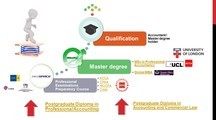
Accounting & Finance Accounting
Accounting Programmes
- Sort by
- Programme Title

The feature of this degree is to provide students with useful and relevant background in account and finance. This degree not only provides students with accounting techniques and focuses on computational skills with the aim of immediate application, but also enables students to evaluate the usefulness of their studies in different contexts and allows for them to further proceed into professional accounting and financial studies. The program is suitable for people who are interested in accounting and finance, accounting professions, investment banking, investment analysis and management, and etc.
The programme aims to provide an opportunity to demonstrate independent academic research skills and apply them in real-world and simulated professional contexts, which will include the requirement to present an analysis of and potential solutions and recommendations to an accounting, finance or strategic management related organisational issue in a format suitable for a finance professional.
This preparatory course aims to provide tuition support to students for studying the MSc in Professional Accountancy, University of London (UCL).
This programme aims to provide students with a sound understanding of the purposes, nature and operation of global capital markets. It seeks to identify who uses them, and why, and how. Within that it illustrates the dynamics of the interactions of actions as capital is exchanged using financial instruments to generate returns while managing risk. It reveals the context in which these actors operate in markets, and particularly so in the context of regulations imposed on markets. Additionally, it seeks to illustrate an evolving regulatory legacy and evolving attitudes to risk-return trade-offs.
This preparatory course aims to provide tuition support to students for studying the MSc in Professional Accountancy, University of London (UCL).
This programme seeks to provide knowledge, understanding, and skills to apply tools to investment opportunities. As such it sets out to develop skills in a range of areas which contribute to the construction of a robust business case which demonstrates that key risks have been identified, analysed, and evaluated. Such areas would include data analysis, structuring decisions, building decision models, risk assessment, and trade-offs. By the end the programme, students would be able to identify and select appropriate types of analysis to improve decision making under uncertainty and add value.
This preparatory course aims to provide tuition support to students for studying the MSc in Professional Accountancy, University of London (UCL).
This programme seeks to an understanding of the nature and purposes of, and issues within investment decisions in a range of investment opportunities. In doing so, it articulates and applies principles of investments in shares, bonds, mutual funds, and other securities, within an investment portfolio. It further sets out to provide a practical familiarity with issues in investment in derivatives, and in real estate.
This preparatory course aims to provide tuition support to students for studying the MSc in Professional Accountancy, University of London (UCL).
The programme aims to provide participants with a theoretical and practical understanding of the evolving nature and applications of finance and accounting models. The evolutions stem from changes in the economic, political, regulatory and technological environment. In doing so, students could look at the established history, the current situation, and explore implications for the future.
The programme provides students with the opportunity to demonstrate their ability to assess the impact of such changes on organisations and a range of relevant stakeholders. It aims to explore current issues in financial reporting, financial management and corporate finance disciplines and to provide opportunities for students to develop their skills in critical analysis and evaluation of alternative solutions.

A Master with distinction completed in 6 months! Hear the story at https://london.ac.uk/news-opinion/london-connection/profiles/shagufa-jamaldeen
ACCA CPD Units
One hour of learning equates to one CPD unit. Your studies could easily provide your full 40 units for one year.
Excellent Results! Our students achieved :
HKICPA QP Prize award for Top students;
CPA Australia Distinction Award;
ACCA Silver Medalist and Top Affliates
This Programme offers you - the accounting knowledge required in commercial world - a FAST-TRACK to become a professional accountant.
Holders of the HKU SPACE MasterCard can enjoy a 10-month interest-free instalment period for courses with a tuition fee worth a minimum of HK$2,000.














